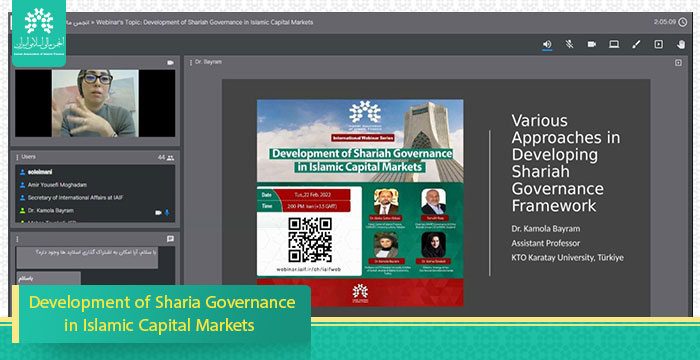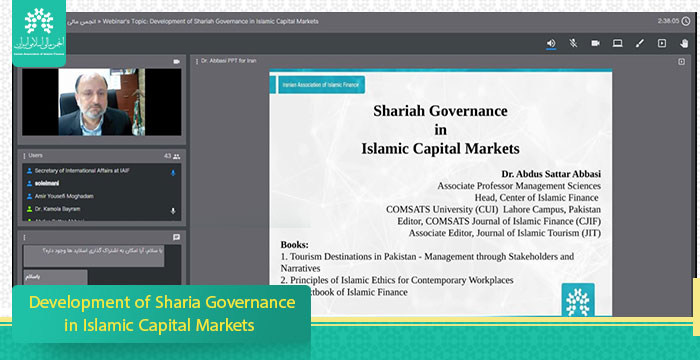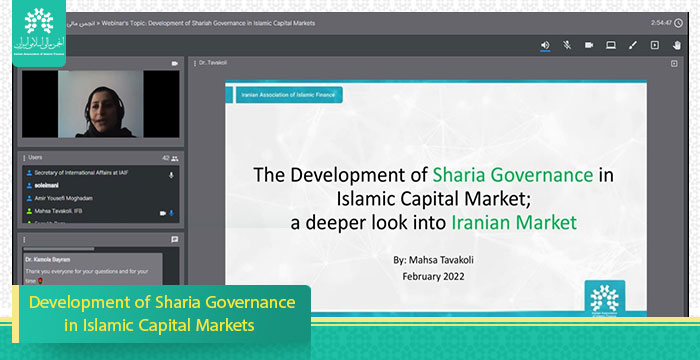



IAIF held an international webinar on ‘Development of Sharia Governance in Islamic Capital Markets’.
The Iranian Association of Islamic Finance held an international webinar on ‘Development of Sharia Governance in Islamic Capital Markets’ on 22 Feb. 2022.
First speaker:
Mohammad Farrukh Raza, CEO at IFFAS Group, Chairman of Governance and Ethics Board at AAOIFI, Bahrain
At first he talked about responsibilities of a business in terms of social responsibilities, including economic, legal, ethical and benevolent activities. The first two ones are as a must and the last one is voluntary.
Regarding corporate governance and shariah, Raza said the concept of stewardship in Islam mandates a wider range of responsibilities on shareholders, investors or donors than just being owners of funds.
Therefore, the principles of sound corporate governance are largely in line with Shariah as a Shariah compliant entity with high standard of corporate governance shall typically comply with the following Shariah requirements, among others:
Not harmful to mankind, animals, and the environment, instead, its actions shall be beneficial to all.
Dealing fairly with customers - products are suitable for their needs, and staff interactions with clients are courteous and efficient.
Capital adequacy - Shariah requires everyone (individuals, organisations and institutions) to fulfil their obligations at all times.
Competing properly with rivals - hoarding, monopoly and any manipulation to corner the market are not allowed in Shariah.
Ensuring personal and confidential information about the institution’s customers, staff and other parties is held securely and not open to abuse.
Ensuring that members of staff are treated fairly and in turn, staff respect the institution and act professionally in their daily dealings.
Promoting transparency – e.g. the customer’s ignorance of the market cannot be deliberately exploited or abused.
Then he mentioned that governance in Islamic finance is divided into two parts; corporate governance and shariah governance. Corporate governance such as commercial sector, banks, Takaful…and shariah governance such as social sector, microfinance, zakat, Waqf and so on.
The CEO of IFFAS as to the governance of Islamic financial institutions mentioned the corporate governance of Islamic Financial Institutions (IFIs - whether commercial or social) is currently modelled, in a similar way to conventional financial institutions with the following key differences:
Corporate governance in IFIs has an additional layer of Shariah governance.
Shariah governance affects the interests of all stakeholders.
The executive management shall own the ultimate responsibility for ensuring Shariah compliance of the IFI’s products, transactions, activities, operations etc.
The BoD shall ensure that the executive management has put in place adequate resources to establish and maintain a robust Shariah governance framework.
Additional corporate governance arrangements/requirements/disclosures related to the unique nature of some Islamic financial products/models (e.g. rights of Islamic depositors, inherent limitations in the current Takaful model, appropriate code of ethics and conduct for staff of IFIs, additional unique disclosures etc.)
Shariah governance has developed significantly over the last two decades as Islamic finance continues gaining momentum as an industry.
The importance of Shariah governance in Islamic finance encapsulates the following:
Compliance with Shariah in all aspects and at all times.
‘Raison d’etre’ for an Islamic financial institution.
Legitimacy and justification to the claim of being Islamic made by the financial institution.
Exposure of an Islamic financial institution to Shariah non-compliance risk in case of non-observance of Shariah governance, potentially resulting in reputational damage, loss of profit.
Creation of systemic risk due to non-observance of Shariah governance by Islamic financial institutions in a single market.
The chairman of the Governance and Ethics Board at AAOIFI defined, Shariah non-compliance risk, going on to say that It is the risk of reductions in earnings or value, through financial and/or reputational loss resulting from products / services / transactions / operations / activities being Shariah non-compliant.
Somewhere else he talked about the key components of the Shariah governance framework:
National-level
Central Shariah Board(s) (CSB), where applicable
Institutional-level
Shariah Supervisory Board (SSB)
. Advisory role: Clarification or opinions on Shariah compliance matters in association with the ISD
. Approval role: Approval and certification for the product structures and all documentation
. Audit role: Leading the ongoing Shariah verification of the IFIs’ transactions and operations (in coordination with the ISD and the external Shariah auditor) and accordingly issuing an Annual Shariah Compliance Statement (Annual Fatwa)
Internal Shariah Department(s) (ISD)
Shariah non-compliance risk management
Shariah compliance review and research
Secretariat of the SSB
Internal Shariah audit
External Shariah audit
At the end Farrukh Raza said, requirements of Shariah governance apply to all types of licensed/authorised IFIs, whether full-fledged or Islamic windows of conventional institutions. It also applies to all Shariah compliant financial instruments e.g. Sukuk, other capital and money market products.
An increasing number of regulators have issued elaborate sets of regulations pertaining to Shariah governance in their respective jurisdictions, however some jurisdictions are suffering a lag in implementation and effective supervision.
AAOIFI and IFSB are jointly developing a unified Shariah governance standard for Islamic finance industry that shall cover comprehensive aspects of governance in across all segments of Islamic finance industry.
Adoption and enforcement of AAOIFI standards is the way forward to develop a sustainable and productive industry.
Second speaker:
Dr. Kamola Bayram, Professor at KTO Karatay University, Turkey
She started her presentation with the development of Islamic financial systems, including Islamic banking, Islamic capital markets and Takaful.
Bayram said a strong Islamic financial market can be established only if three sectors, i.e., Islamic banking, Takaful and the Islamic Capital Market (ICM) support each other.
The ICM is the most important market out of the three because it is necessary for the survival of the other two.
In the Malaysian context, Islamic banking and Takaful are under the control of the Central Bank of Malaysia, i.e., Bank Negara Malaysia and ICM is under the supervision of the Security Commission.
In the case of conventional corporate governance, Bank Negara Malaysia and the Security Commission have issued best practices for corporate governance. However, for Shari’ah corporate governance, only Bank Negara Malaysia has issued a Shari’ah Governance Framework designed for Islamic banks and Takaful operators.
There is yet to be a suggested “Best Practices of Shari’ah Corporate Governance” for ICM.
Regarding Shari’ah corporate governance, she said IFSB (2009) defines the Shari’ah governance system as, “a set of institutional and organizational arrangement through which an Islamic financial institution ensures that there is effective independent oversight of Shari’ah compliance over each of the following structures and process:
Issuance of relevant Shari’ah pronouncement or resolution. This refers to a juristic opinion on any matter pertaining to Shari’ah issues in Islamic finance given by the appropriately mandated Shari’ah board.
Dissemination of information on such Shari’ah pronouncement or resolutions to the operative personnel of the IFIs who monitor the day-to-day compliance with the Shari’ah resolutions vis-à-vis every level of operations and each transaction. However, this task would normally be done by the internal Shari’ah compliance department. Shari’ah governance is to ensure that all the business activities of Islamic financial institutions are operating in line with the Shari’ah.
The Professor of KTO University mentioned that there are five approaches to developing the Shari’ah Corporate Governance Framework;
1. Reactive Approach: This approach is prevalent in non-Islamic legal frameworks wherein the Islamic financial institutions are operating. However, the regulations are silent on introducing the Shari’ah governance framework. The institutions have to operate within the existing conventional framework and at the same time comply with the Shari’ah. This is suitable in the United Kingdom, whereby the regulators will get involved only if there are issues that may affect the industry.
2. Passive Approach: This approach is implemented in Saudi Arabia. There is no Shari’ah advisory council at the central level or higher authority. The Shari’ah governance is practiced at an individual level and it is purely on the initiative and voluntary basis and is not regulated.
3. Minimalist Approach: In this approach, although the regulatory bodies do not introduce their own Shari’ah governance framework, the Islamic financial institutions are nevertheless expected to have good Shari’ah governance practices. Hence, it can be said that in this approach, there is a concern and slight intervention from the regulatory bodies. This is practiced mostly in the GCC countries except for Oman and Saudi Arabia. Jurisdictions such as Bahrain, Dubai and Qatar prefer the adoption of AAOIFI standards on Shari’ah Governance.
4. Pro-active Approach: This approach can be termed the regulatory based approach. This is the favoured approach in Malaysia. The central bank or authority provides the guidelines and the Islamic financial institutions are required to adopt. The initiation is started from the regulatory body. This approach can be further divided into three sub approaches, namely the prescriptive approach, non-prescriptive approach and hybrid approach.
5. Intervention Approach: This approach is the intervention approach. In this approach, the third party makes the decisions on Shari’ah matters related to the Islamic financial institutions. In Pakistan, the Shari’ah Federal Court is the highest authority in dealing with the institutions regardless of having a Shari’ah board at the State Bank of Pakistan level.
Finally Dr. Bayram said the essence of Islamic finance is Shari’ah compliance. The Islamic financial markets were thus created with a view to ensure it. However, unfortunately, many researchers reported that the ICM failed to meet Shari’ah requirements. Among them, Dusuki (2009) calls ICM products innovative which question its Shari’ah compliance. The industrial players and regulatory bodies concentrate on the legal forms of the Shari’ah compliant contract rather than the substance of the products. In addition, during the Accounting and
Auditing Organisation for Islamic Financial Institutions (AAOIFI) annual meeting in Bahrain in November 2007, Sheikh Taqi Usmani made the remark that almost 85% of Sukuk issued in the GCC were not Shari’ah compliant and the Sukuk market is falling (Thomson Reuters Zawya, 2014).
According to Wan Azmi (2007), it is crucial for ICM to have an efficient regulatory framework, especially concerning the Shari’ah, for future development.
Third Speaker:
Dr. Abdus Sattar Abbasi, Professor at COMSATS University Lahore Campus, Head, Center of Islamic Finance, Pakistan
He started his presentation with SGF in ICM the Case of Pakistan, including Shariah screening criteria, Shariah advisors, Shariah compliance, audit and review.
Dr. Abbasi mentioned that Shariah screening criteria say:
Core business should not violate any principle of Shariah
The interest bearing debt to asset ratio should be less than 37%
The ratio of non-Shariah compliant investments to total assets should be less than 33%
The ratio of non-Shariah compliant income to total revenue should be less than 5%
The ratio of illiquid assets to total assets should be at least 25%
Market price per share should be at least equal to or greater than net liquid assets per share
(net liquid assets = liquid assets – current liabilities)
SECP conducts bi-annual review of listed Shariah compliant companies.
Regarding the Shariah advisors in Pakistan, Head of the Islamic finance Center at COMSATS said, Shariah advisors are appointed according to the criteria who report to the board of directors.
Shariah advisors ensure that the inflows and outflows of resources are free from: Riba (interest, usury or any other form), Qimar (Gambling), Gharar (Uncertainty) and other vices prohibited by the Shariah.
Shariah advisors guide on regular basis that the business, transactions and investments made are in accordance with the Maqasid-al-Shariah.
Review financial instruments, and make recommendations for potential improvements.
As to Shariah review report, Abbasi stressed that it is to determine whether or not in their opinion, the transactions, the relevant documentations and the procedures adopted have been in accordance with principles of Shariah.
Moreover, Shariah Audit and Compliance, including internal Shariah audit, external Shariah audit and Shariah Compliance Officer.
Somewhere else he defined zero-leverage, going on to say that it means zero-interest and dividend-paying zero-leverage firms pay substantially higher dividends, are more profitable, pay higher taxes, issue less equity, and have higher cash balances (Strebulaev and Yang, 2013)
We need to facilitate financing and investment needs of companies operating in country like Pakistan to eliminate following two conditions:
The interest bearing debt to asset ratio should be less than 37%
The ratio of non-Shariah compliant investments to total assets should be less than 33%
At the end, Dr. Abbasi stressed that technically zero-leverage firms operating in Pakistan are Shariah compliant companies. However, expansion needs sometimes bring inevitable challenges.
Therefore, we need to strengthen both the banking institutions and the capital markets to develop zero-interest ecosystem for business organizations in countries like Pakistan and Iran where all other conditions of Shariah compliance are in place in the makeup of the societies.
Fourth speaker:
Dr. Mahsa Tavakoli, Strategy Director at Iran Fara Bourse
She dealt with ‘The Development of Sharia Governance in Islamic Capital Market; a deeper look into Iranian Market’ in her presentation.
Regarding the sharia committee structure, she said it consists of SEO (Securities and Exchange Organization), Department of research, development& Islamic studies, Sharia board secretariat and Sharia board.
There are 8 Members including:
5 Scholars with capital market knowledge assigned by SEO Board
1 Economist with Capital Market expertise assigned by SEO Chairperson
1 Financial Expert with Capital market knowledge assigned by SEO Chairperson
1 Law Expert with Capital Market Knowledge assigned by SEO Chairperson
Moreover, the members’ qualification is as follows:
Sharia expertise especially in Fiqh Al-Muamelat
Educational Background in Finance or Economics
Related work Experience
Proficiency in Arabic and English
As to the responsibilities and scope of work of the members, Tavakoli said:
Evaluating the application of newly proposed financial instruments in exchanges and over-the-counter markets from a jurisprudential perspective,
Resolving any doubts when deploying financial instruments,
Proposing new Islamic financial instruments to be approved the board of directors to be applied in the markets,
Cooperating with similar committees and councils in other local and foreign organizations and,
Solving jurisprudential ambiguities within the capital market.
Somewhere else the strategy director of Iran Fara Bourse said Sharia compliance process including:
Receiving a request to review an issue / applicant may be a SEO department or an institution outside the SEO / the applicant mostly include operational details
Reviewing sharia background and history of the issue / relevant scientific articles and papers/ reviewing related Istiftaat
Themes to explain the issue / making scientific profile/ studying different aspects of issue (financial, economic, legal and Fiqh)
Applying for Qom Islamic capital market’s Committee opinion on the issue/ 1 or 2 members of Sharia board attend the Qom meeting/ it is a sharia advisory council for the sharia board
Discussing the issue, ratifying a model or solution or suggestion / Expert will present the issue and after members’ discussion in 1 or several meeting, the sharia board chair will announce the results/ The conclusion and the minute will be read and signed by members and will be communicated with stakeholders.
Regarding ESG (Environmental, Social, and Governance) and Islamic finance, Tavakoli said ESG and shariah-compliant investing have similar goals. Each promotes responsible financial stewardship and societal value creation. Still, investors have tended to view the two strategies as distinct and separate.
This is beginning to change, though. The Islamic asset management industry wants to unite sustainable, responsible, and Islamic investing. Their goal is to complement conventional investment strategies.
Still, there are obstacles to contend with when merging disparate value systems. This is the case with those grounded in both Islamic and non-Islamic faith values. Or those lacking a formal faith.
One pronounced disparity involves Islamic concerns with practices considered “riba”. Riba refers to usury or unequal exchanges and has a strong bearing on stock investment decisions.
As to the challenges of REGTECH and SUPTECH, the speaker mentioned Islamic finance struggles with intersecting, often conflicting, regulations and religious rulings (fatwas).
Frequently revised regulatory frameworks and compliance milestones add further complexity to already overlapping and sometimes contradicting requirements. The volume of regulations and regulatory change exceed what can reasonably be processed without cognitive solutions.
RegTech, which is a blend of both regulation and technology, is aimed at enhancing the transparency, consistency and standardization of regulatory processes. Similarly, supervisory technology – or “SupTech” – is also gaining momentum. One reason for this, among many, is the need for supervisors to adopt similar technology to that used by the financial institutions in order to optimize cooperation between the two in matters relating to the collection and sharing of data.
At the end she said what we did in Iran to develop the infrastructure is establishing the Iranian Association of Islamic Finance (IAIF) to provide:
Training industry practitioners and scholars about Islamic Finance
Publications
A database for articles and researches and Fatwas
Work closely with international counterparts
Suggesting guidelines to improve the regulatory framework


